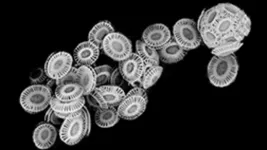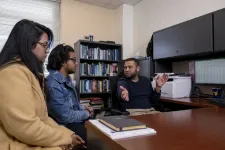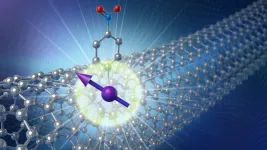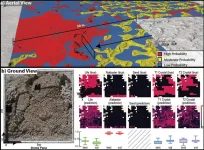(Press-News.org) A Rutgers-led team of scientists studying virus-host interactions of a globally abundant, armor-plated marine algae, Emiliania huxleyi, has found that the circular, chalk plates the algae produce can act as catalysts for viral infection, which has vast consequences for trillions of microscopic oceanic creatures and the global carbon cycle.
“In a drop of seawater, there will be about 1,000 to 10,000 E. huxleyi cells, and about 10 million viruses,” said Kay Bidle, a professor in the Department of Marine and Coastal Sciences at Rutgers School of Environmental and Biological Sciences (SEBS) and a senior author on the study. “They’re all in a sort of arms race against each other and we are studying it to see how it plays out and impacts Earth’s carbon cycle.”
Reporting in Science Advances, the researchers said they discovered, through observations both in the ocean and in the laboratory, that the chalk (calcium carbonate) plates, called coccoliths, are a previously unrealized central player in viral infections that can collapse phytoplankton blooms the size of some countries within weeks.
“Coccoliths can act as catalysts for death, delivering viruses directly to algae cells for successful infection,” said Christopher Johns, a doctoral student in the Department of Marine and Coastal Sciences at SEBS and lead author on the study.
E. huxleyi is a one-celled species of phytoplankton, which, like trees, performs photosynthesis. In the case of phytoplankton, they convert carbon dioxide dissolved in ocean water into organic compounds, and at the same time produce oxygen.
“The phytoplankton in the oceans contribute about half of Earth's oxygen, with the other half coming from land plants,” Bidle said. “Every other breath you take is from phytoplankton.”
E. huxleyi is well-known for its ability to biomineralize calcium carbonate, similar to corals, by producing coccoliths, which are arranged on the cell surface to form an armored layer. These coccoliths are produced and then shed into the surrounding seawater in a continuous cycle.
For years, the function of these coccoliths has been poorly understood, according to Bidle. Researchers believed the chalk armor existed in part to protect phytoplankton from getting infected by viruses. And the discarded, free coccoliths were commonly thought of as passively drifting planktonic particles with little biological or ecological roles.
But in experiments conducted in laboratories on the Cook campus at Rutgers University–New Brunswick, Johns and other team members observed that the expelled coccoliths can find their way back to the E. huxleyi cells, reattach, and at the same time ferry viral particles, facilitating infection. This ability to propagate and catalyze infection is one unexpected role of the coccoliths with important potential ecosystem outcomes.
The discovery also has an important connection to climate change and the Earth’s carbon cycle, Bidle said. Infected E. huxleyi cells produce a sticky glue that can help aggregate particles into what is called “marine snow.” When marine snow sinks to the deep ocean, it helps to sequester and bury carbon, removing it from the atmosphere for centuries to millennia. Coccoliths are important in this process because they are heavier than seawater and help make particles sink faster and more rapidly into the deep ocean.
By assisting in the death of the phytoplankton, as well as in marine snow formation and sinking, the coccolith biominerals can ultimately have a positive impact on the removal of carbon dioxide from the upper ocean and atmosphere, Bidle said.
“This means the coccoliths facilitate the process of sequestering or sinking carbon into the deep ocean for thousands of years, making them important players in balancing the Earth’s carbon cycle,” Bidle said.
Other Rutgers researchers on the study include Associate Professor Heidi Fuchs; Karen Grace Bondoc-Naumovitz, a former postdoctoral fellow now at the University of Exeter in England; and Alexandra Matthews, a former undergraduate student, all within the Department of Marine and Coastal Sciences.
Researchers from the U.S. Department of Energy’s Oak Ridge National Laboratory, the University of California-Santa Barbara, and the University of North Carolina-Wilmington also were involved in the study.
END
Microscopic chalk discs in oceans play a key role in earth’s carbon cycle by propagating viruses
Rutgers-led research finds biomineral structures formed by marine algae foment viral infection, contributing positively to capture CO2
2023-03-06
ELSE PRESS RELEASES FROM THIS DATE:
WVU water quality expert develops public tool for diagnosing health of America’s streams
2023-03-06
A model for predicting the levels of oxygen in water, developed by West Virginia Universityresearcher Omar Abdul-Aziz, gives citizen scientists nationwide a tool for taking action on stream pollution.
“I have been looking at water quality data for 20 years,” said Abdul-Aziz, an associate professor at the Benjamin M. Statler College of Engineering and Mineral Resources. “I can tell you that a big percentage of streams in the United States are polluted. Urban streams are getting dumpster runoff, stormwater ...
Iron & the brain: Where and when neurodevelopmental disabilities may begin during pregnancy
2023-03-06
The cells that make up the human brain begin developing long before the physical shape of the brain has formed. This early organizing of a network of cells plays a major role in brain health throughout the course of a lifetime. Numerous studies have found that mothers with low iron levels during pregnancy have a higher risk of giving birth to a child that develops cognitive impairments like autism, attention deficit syndrome, and learning disabilities. However, iron deficiency is still prevalent in ...
Long-term intermittent fasting reduces COVID-19 heart failure complications and death in patients with previous heart disease
2023-03-06
Intermittent fasting, especially when done over the course of decades, can have positive effects on metabolic and cardiovascular health. Now, a new study by researchers at Intermountain Health in Salt Lake City finds that it may also add an extra layer of protection from heart-related COVID-19 complications in people who had already sought cardiac care.
“We already know that regular fasting over long periods of time can lead to overall health improvements. Here we found that it may also lead to better outcomes in COVID-19 patients who required a cardiac catheterization,” said Benjamin Horne, PhD, director of cardiovascular and genetic epidemiology ...
Study finds residual inflammation after statin therapy strongly predicted cardiovascular events, death
2023-03-06
New evidence released today from a study of 31,245 patients already taking statin therapy indicates that inflammation may be a more powerful predictor of risk of future cardiovascular events—such as heart attack and stroke — than “bad” cholesterol. Treatments that aggressively lower vascular inflammation need to be incorporated into daily practice if doctors are to maximize patient outcomes, according to the study’s corresponding author, Paul Ridker, MD, a preventive cardiologist at Brigham and Women’s Hospital, a founding member of the Mass General ...
Study finds exhaled breath could enhance detection, diagnosis of COVID-19 and variants
2023-03-06
The emergence of new COVID-19 variants has led to reduced accuracy across current rapid testing methods, but a recent University of Michigan study suggests that a patient’s breath might hold the key to a more precise diagnosis.
Investigators from the University of Michigan’s Max Harry Weil Institute for Critical Care Research and Innovation, including faculty and students from the College of Engineering and Michigan Medicine, used portable gas chromatography to examine breath samples collected during the pandemic’s Delta ...
Some ‘allies’ don’t want gay neighbors
2023-03-06
In a survey of 545,531 people, 8.5% of those who said they were ‘fully accepting’ of gay people did not want gay neighbors.
First study to explore stigmatizing behaviors expressed by avid supporters of sexual minorities
‘Simple legal inclusion can help mobilize the accepting population to their fullest potential’
CHICAGO --- When legal systems choose to offer no protections to sexual minorities, even avid LGBTQ supporters would reject their gay neighbors, reports a new Northwestern Medicine study.
The study examined ...
An innovative twist on quantum bits: Tubular nanomaterial of carbon makes ideal home for spinning quantum bits
2023-03-06
Scientists find that a tubular nanomaterial of carbon makes for ideal host to keep quantum bits spinning in place for use in quantum information technologies.
Scientists are vigorously competing to transform the counterintuitive discoveries about the quantum realm from a century past into technologies of the future. The building block in these technologies is the quantum bit, or qubit. Several different kinds are under development, including ones that use defects within the symmetrical structures of diamond and silicon. They may one day transform computing, accelerate drug discovery, generate unhackable networks and more.
Working with researchers from several universities, scientists ...
LOINC continues facilitating health data interoperability with biannual issuance of new concepts
2023-03-06
INDIANAPOLIS -- LOINC® from Regenstrief Institute is issuing its semi-annual release, which contains 608 new concepts to help health systems, laboratories and other health organizations accurately exchange medical data. Some of the new information has been released in coordination with the U.S. Food and Drug Administration, the U.S. Centers for Disease Control and Prevention and the Association of Public Health Laboratories.
“Aligning the release of LOINC with emerging healthcare trends is an important component of our mission and critical in promoting effective health information exchange among providers, patients and health systems,” said Marjorie Rallins, ...
New study uncovers key culprit behind pediatric brain cancer metastasis
2023-03-06
New research pinpoints a key cause of metastasis from an aggressive form of brain cancer in children and provides a potential new therapy for treating these tumors in the future.
In a paper, published in Nature Cell Biology, physician-scientists from the University of Pittsburgh and UPMC Children’s Hospital of Pittsburgh discovered that medulloblastomas hijack a skill that normal brain cells use during their early development and then manipulate it to help tumors spread.
“Children with medulloblastomas that have not yet metastasized may have a high likelihood of long-term survival, but if ...
Can artificial intelligence help find life on Mars or icy worlds?
2023-03-06
March 6, 2023, Mountain View, CA – Wouldn’t finding life on other worlds be easier if we knew exactly where to look? Researchers have limited opportunities to collect samples on Mars or elsewhere or access remote sensing instruments when hunting for life beyond Earth. In a paper published in Nature Astronomy, an interdisciplinary study led by SETI Institute Senior Research Scientist Kim Warren-Rhodes, mapped the sparse life hidden away in salt domes, rocks and crystals at Salar de Pajonales at the boundary of the Chilean Atacama Desert and Altiplano. Then they trained a machine learning model to recognize the patterns and rules associated with their distributions ...
LAST 30 PRESS RELEASES:
ASU researchers to lead AAAS panel on water insecurity in the United States
ASU professor Anne Stone to present at AAAS Conference in Phoenix on ancient origins of modern disease
Proposals for exploring viruses and skin as the next experimental quantum frontiers share US$30,000 science award
ASU researchers showcase scalable tech solutions for older adults living alone with cognitive decline at AAAS 2026
Scientists identify smooth regional trends in fruit fly survival strategies
Antipathy toward snakes? Your parents likely talked you into that at an early age
Sylvester Cancer Tip Sheet for Feb. 2026
Online exposure to medical misinformation concentrated among older adults
Telehealth improves access to genetic services for adult survivors of childhood cancers
Outdated mortality benchmarks risk missing early signs of famine and delay recognizing mass starvation
Newly discovered bacterium converts carbon dioxide into chemicals using electricity
Flipping and reversing mini-proteins could improve disease treatment
Scientists reveal major hidden source of atmospheric nitrogen pollution in fragile lake basin
Biochar emerges as a powerful tool for soil carbon neutrality and climate mitigation
Tiny cell messengers show big promise for safer protein and gene delivery
AMS releases statement regarding the decision to rescind EPA’s 2009 Endangerment Finding
Parents’ alcohol and drug use influences their children’s consumption, research shows
Modular assembly of chiral nitrogen-bridged rings achieved by palladium-catalyzed diastereoselective and enantioselective cascade cyclization reactions
Promoting civic engagement
AMS Science Preview: Hurricane slowdown, school snow days
Deforestation in the Amazon raises the surface temperature by 3 °C during the dry season
Model more accurately maps the impact of frost on corn crops
How did humans develop sharp vision? Lab-grown retinas show likely answer
Sour grapes? Taste, experience of sour foods depends on individual consumer
At AAAS, professor Krystal Tsosie argues the future of science must be Indigenous-led
From the lab to the living room: Decoding Parkinson’s patients movements in the real world
Research advances in porous materials, as highlighted in the 2025 Nobel Prize in Chemistry
Sally C. Morton, executive vice president of ASU Knowledge Enterprise, presents a bold and practical framework for moving research from discovery to real-world impact
Biochemical parameters in patients with diabetic nephropathy versus individuals with diabetes alone, non-diabetic nephropathy, and healthy controls
Muscular strength and mortality in women ages 63 to 99
[Press-News.org] Microscopic chalk discs in oceans play a key role in earth’s carbon cycle by propagating virusesRutgers-led research finds biomineral structures formed by marine algae foment viral infection, contributing positively to capture CO2





